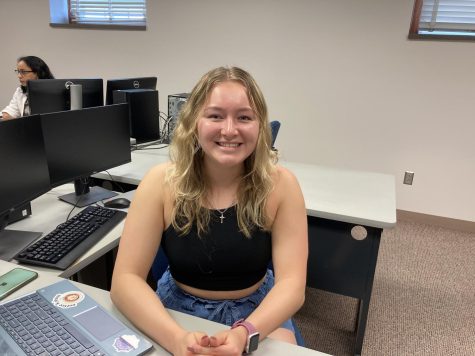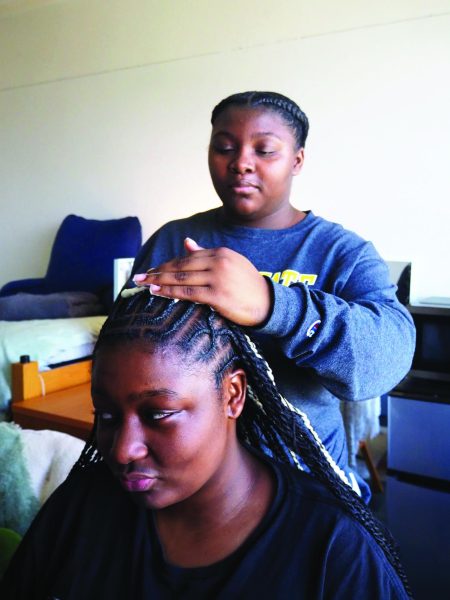WSC’s cooperative education harvesting change in Peru
January 24, 2023
When the freshman students at Wayne State College’s Growing Together Cooperative Education program were handed a packet and asked how they could make a difference in South America, they were slightly caught off guard.
“How can we possibly help people all the way in Perú? What can we do in little old Wayne, Nebraska?” Tori Shatto, freshman member of Growing Together, said. And rightfully so.
This seems unrelated to any kind of problems they would encounter in rural Nebraska. However, Michael Keibler, executive director of Cooperative Education and Industry Liaison, begged to differ.
The Peru Coffee Project is a team-based multi-case study initiative, done in collaboration with the Andean Alliance for Sustainable Development (AASD) in Calca, Perú. The AASD is an agricultural organization whose mission is to harness collective intelligence to support community-led development in the highlands of Perú.
The students participating are freshman members of the Growing Together program, made up of five different majors and 23 fields of study. Keibler said he is acquainted with the co-founder of AASD, so when he heard about this cooperative opportunity, he knew he wanted to get his students involved.
Keibler said the coffee farmers in Peru are currently struggling with commercialization and exploitative business practices by coffee buyers, preventing farmers from reaching their economic potential.
“The farmers are low educated and there is no internet service,” Keibler said. “They have about one to two acres of farmland, they have to pick the berries, put them on donkeys and take them two hours down to the market to sell. Then they are offered well below market value for their product.”
Keibler said in 2021, the AASD and coffee farmers of the Mapacho Basin in Perú founded the company Café Orígenes to help farmers increase production, enhance product quality, and purchase coffee for higher than fair trade prices to sell directly to ethical coffee roasters.
The program has two goals in mind: to contribute to the AASD and the community and to educate a group of socially and culturally responsible students.
While the Growing Together program’s main initiative is to keep new business leaders, employees and teachers in Nebraska, Keibler said he wants his students to realize how worldly factors affect them in the United States.
“The whole thing is to really get them to critically think on a global scale,” Keibler said.
The project has multiple steps. Students were first broken into small groups based on their majors and fields of study. Then, each group received a journal article about an issue relating to their focus to deconstruct and compare to the problems that the farmers are experiencing in Perú.
The groups all focus on a different factor affecting Peruvian coffee farmers, including social media, marketing, education, coffee industry, technology and Perú as a country, Keibler said.
After analyzing the issues, Keibler said the students will propose several solutions that could be presented to the Peruvian farmers. They will then write a reflection on what they have personally learned from this experience. The AASD will then take their findings and solutions and use it to educate farmers and their communities. This will help them determine potential paths of coffee product marketing and distribution.
“I have a lot of students and they’re smart kids,” Keibler said. “I want to know what they know. The students are the ones who do the work. I’m just here to facilitate it. I love watching them brainstorm through these things and see those ideas come to life.”
Braxton Dalton, business marketing major and small group leader, said he is excited to think outwardly towards the world around him through this project.
“This project is a great way to see what is going on in the international economy,” Dalton said. “I want to make sure that we solve these issues of farmers getting paid a fair price for the coffee they are producing, especially as intermediary companies are raising prices for consumers but not giving any of that extra profit to the farmers. To me, it gives us a way to notice and work on an issue before it gets too big to fix.”
Trey McQuay, fellow member of Dalton’s small group, said he is ready to make a difference in a big way.
“The fact that we have the ability to make a difference is what I enjoy most about this project” McQuay said. “In the future, growing together cohorts will have even more opportunities to make a difference. Many different organizations have reached out to us in attempts to get growing issues written about.”
Both members said they are looking forward to the personal growth they will receive from this project.
Dalton said the Peru Coffee Project has opened his eyes to other agricultural businesses as well.
“I would love to continue to do research after we are done with this project about other agricultural markets like beef and poultry,” Dalton said. “Learning this about Peru makes me wonder if there are similarities with other agricultural markets.”
McQuay said he is reaping the benefits in terms of teamwork.
“I think the skill of learning to work with others is the thing I have learned the most about so far,” McQuay said. “Writing a paper this dense and informative is difficult for a single person but learning to bounce ideas off others and trying to find a good balance of workloads makes this project much more enjoyable.”
And to Shatto, leader of the elementary education small group, this project goes beyond what they can do for Perú.
Shatto said at first it was difficult for her group to find their place in this seemingly business-forward project.
“What does education have to do with it? But as we dug deeper, we were able to really see how education plays an important role in it. Now, my group is super excited and ready to go.”
For Shatto, the main goal for the early education group is to find a way to make an impact.
“Just the fact that we are getting involved and trying to make a difference, trying to improve education, spread awareness about it, I feel like that is the main goal for our group” Shatto said. “We want to show how a better education is going to help the Peruvian coffee farmers and how, if they’re getting a better education, they’re going to have a better life.”
Shatto said the Peru Coffee Project will also help her grow individually as a future educator.
“It’s just really eye-opening, and it’s not something that I would ever have to experience,” Shatto said. “I like being aware of the different styles of education because I feel like, regardless of what school or culture it is, you can pull something from everything to benefit everyone in general. I want to stay aware of what there is out there, pulling pieces of what I like education-wise, and creating a curriculum of my own with it.”
However, this project also has something to prove for Shatto’s group, she said.
“Individually, I also want people to understand how important education is,” Shatto said. “When we present [our findings], I want the business majors to understand why education is in the program and how we’re contributing to the coffee project.”









